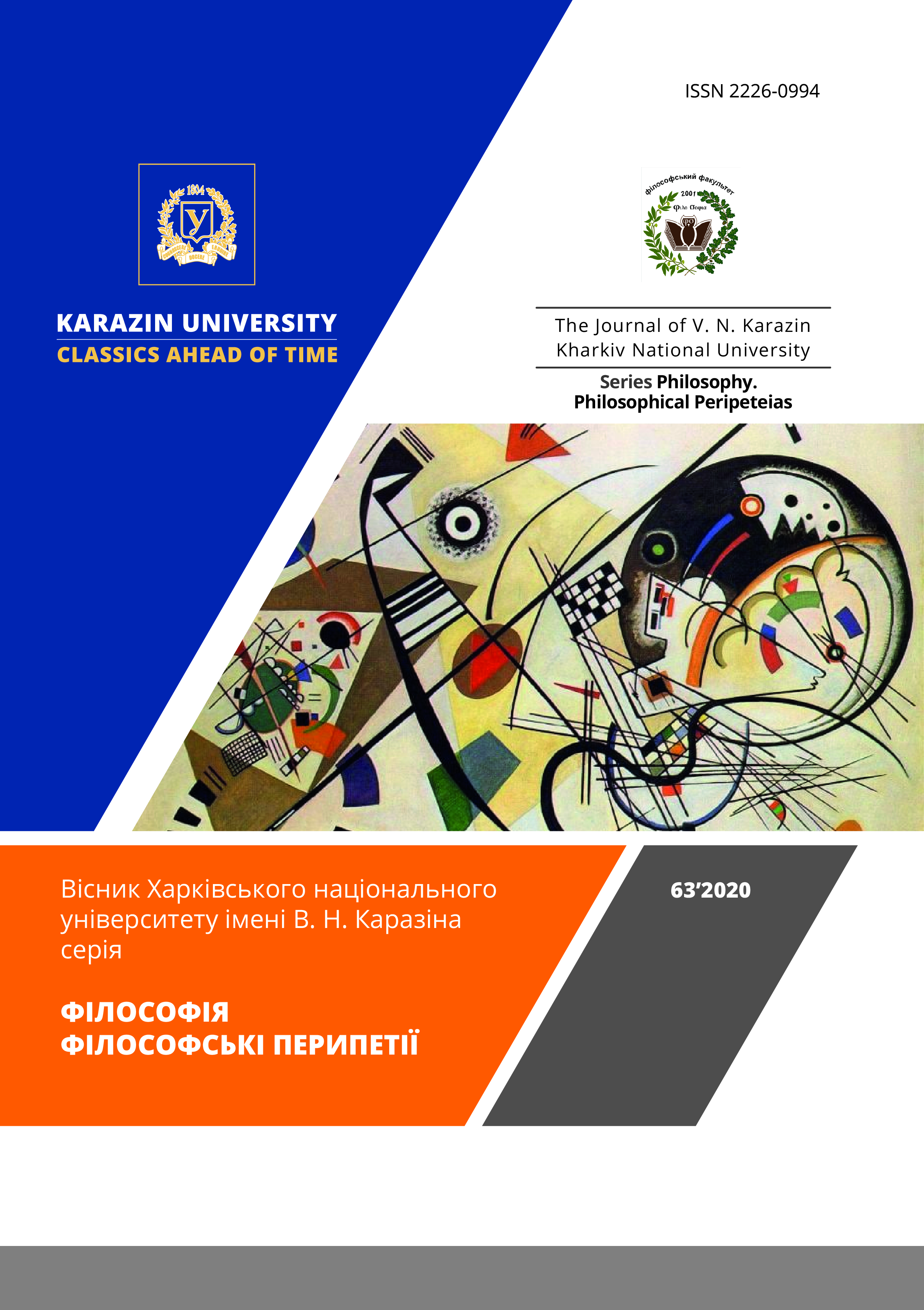THE CONCEPT OF HAPPINESS IN BIOETHICAL RESEARCH (QUALITY OF LIFE CONCEPTION)
Abstract
The topic of happiness is one of the oldest in philosophical researches. Now it is the subject of interest, in particular, for bioethicists, scientists who are looking for the principles of proper treatment of human life, health, and death. The concept of happiness acquires special significance in the quality of life bioethical conception. The author of the article outlines the origins of the understanding of happiness adopted by the supporters of this conception, as well as gives examples of its application by them (above all by P. Singer, L. Nordenfelt, and J. McMahan). The quality of life bioethical conception adopted utilitarian vision of happiness, developed mainly by J. Bentham and J. S. Mill. According to it, happiness is identified with benefit or pleasure, which can be measured and maximized. In the XX century utilitarians began to consider autonomy – the ability of a person to manage his or her own life and death – as an important element of happiness. The influence of the preference utilitarianism is also noticeable. In obedience to it they see happiness in the ability of person to realize his or her rational and autonomous desires. The medical conditions that does not allow it are interpreted as lack of happiness. Thus, they justify not only the admissibility of withdrawing treatment that doesn’t give the expected result, but also of euthanasia. Killing a person, in terms of the quality of life conception, may not be a lack of happiness if the other alternative is to continue living in conditions that do not allow a person to realize his or her preferences, or does not coincide with his or her ideas of a decent life. The lives of persons who do not manifest rationality and autonomy are interpreted as inhuman, as wrongful, and the person as deprived of the right to happiness. Critics of the quality of life conception point to the subjectivity of the criteria by which happiness is measured. The second reproach is the reference to the absence of a hierarchy of values. That is why they give pleasure and absence of suffering too much importance.
Downloads
References
/References
Bentham, J. (2000). An Introduction to the Principles of Morals and Legislation. Kitchiner: Batoche Books. Retrieved from: https://socialsciences.mcmaster.ca/econ/ugcm/3ll3/bentham/morals.pdf. (Original work published 1789).
Chapiński, J. (2005). Psychological Theories of Happiness. In J. Czapiński (Ed.), Positive Psychology. The Science of Human Happiness, Health, Strength and Virtues (pp. 51–102.). Warsaw: PWN Scientific Publisher. (In Polish).
Darwall, S. (2006). The Value of Autonomy and Autonomy of the Will. Ethics, 116(2), 263–284. DOI: https://doi.org/10.1086/498461.
Locke, J. (2019). Essay Concerning Human Understanding. Global Grey.
McMahan, J. (1992). Preferences, Death, and Killing. Retrieve from http://jeffersonmcmahan.com/wp-content/uploads/2012/11/Preferences-Death-and-the-Ethics-of-Killing.pdf.
Mill, J. S. (2001). Utilitarianism. Kitchener: Batoche books. (Original work published 1861).
Nordenfelt, L. (1993). Quality of Life, Health and Happiness. Aldershot: Avebury.
Purdy, L. (2001). Genetics and Reproductive Risk: Can Having Children Be Immoral? In T. A. Mappes & D. De Grazia (Eds.), Biomedical Ethics (5th ed.; pp. 52–57). Boston: McGraw Hill.
Singer, P. (1999). Practical Ethics (2nd ed.). Cambridge: Cambridge University Press.
Ślipko, T. (2012). Bioethics. The Most Important Problems. Cracow: Petrus. (In Polish).
Stepulak, M. Z. (2005). Religious Conditions of Happiness. In J. Czapiński (Ed.), Positive Psychology. The Science of Human Happiness, Health, Strength and Virtues (pp. 51–72). Warsaw: PWN Scientific Publisher. (In Polish).
Taylor, Ch. (2013). A Secular Age (Book 1). (O. Panich, Trans.). Kyiv: Dukh i Litera. (Original work published 2007). (In Ukrainian).
Тейлор Ч. Секулярна доба. Книга перша / пер. с англ. О. Панича. К.: Дух і літера, 2013. 664 с.
Bentham J. An Introduction to the Principles of Morals and Legislation. Kitchiner: Batoche Books, 2000. 248 p. URL: https://socialsciences.mcmaster.ca/econ/ugcm/3ll3/bentham/morals.pdf (дата звернення: 12.07.2020).
Czapiński J. Psychologiczne teorie szczęścia. Psychologia pozytywna. Nauka o szczęściu, zdrowie, sile i cnotach człowieka. Warszawa: Wydawnictwo naukowe PWN, 2005. S. 51–102.
Darwall S. The Value of Autonomy and Autonomy of the Will. Ethics. 2006. Vol. 116, Issue 2 (January). pp. 263–284. DOI: https://doi.org/10.1086/498461.
Locke J. Essay Concerning Human Understanding. Global Grey, 2019. 699 p.
McMahan J. Preferences, Death, and Killing. 1992. 28 p. URL: http://jeffersonmcmahan.com/wp-content/uploads/2012/11/Preferences-Death-and-the-Ethics-of-Killing.pdf (дата звернення: 12.07.2020).
Mill J. S. Utilitarianism. Kitchener: Batoche books, 2001. 63 p.
Nordenfelt L. Quality of Life, Health and Happiness. Aldershot: Avebury, 1993. 182 p.
Purdy L. Genetics and Reproductive Risk: Can Having Children Be Immoral? Biomedical Ethics: 5th Ed. / Ed. by T. A. Mappes, D. De Grazia. New York; Boston: McGraw Hill, 2001. pp. 52–57.
Singer P. Practical Ethics: 2nd Ed. Cambridge: Cambridge University Press, 1999. 217 p.
Stepulak M. Z. Religijne uwarunkowania szczęścia. Psychologia pozytywna. Nauka o szczęściu, zdrowie, sile i cnotach człowieka / Edytowany przez J. Czapiński. Warszawa: Wydawnictwo naukowe PWN, 2005. S. 51–72.
Ślipko T. Bioetyka. Najważniejsze problemy. Kraków: Petrus, 2012. 519 s.

This work is licensed under a Creative Commons Attribution 4.0 International License.
Authors who publish with this journal agree to the following terms:
- Authors retain copyright and grant the journal right of first publication of this work under the terms of a license Creative Commons Attribution License 4.0 International (CC BY 4.0).
- Authors are able to enter into separate, additional contractual arrangements for the non-exclusive distribution of the journal's published version of the work (e.g., post it to an institutional repository or publish it in a book), with an acknowledgement of its initial publication in this journal.
- Authors are permitted and encouraged to post their work online (e.g., in institutional repositories or on their website) prior to and during the submission process, as it can lead to productive exchanges, as well as earlier and greater citation of published work.






3.gif)




